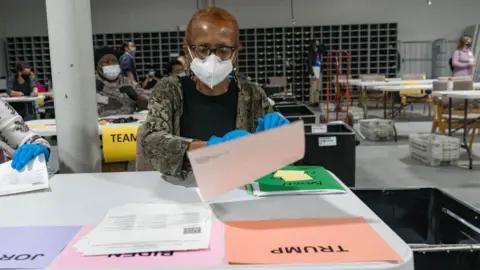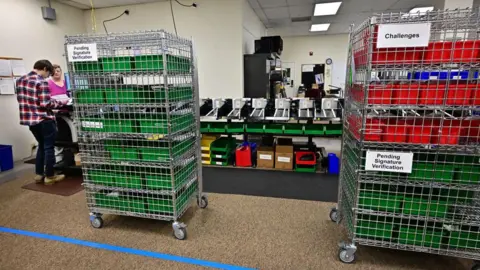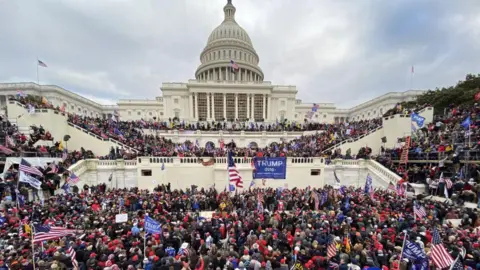
 BBC
BBC
Americans are voting for their next president in a general election that culminates on Tuesday 5 November.
Once polls close, depending on how close the contest is, it is possible a winner will not be projected for several hours, days or even weeks. Here's what you need to know.
When is the 2024 presidential election result expected?
Democrat Kamala Harris, the current vice-president, and Republican Donald Trump, the former president, have been running neck-and-neck for weeks.
National and swing state polls have tightened as 5 November draws closer, so there could be very narrow margins of victory in several places, which may require votes to be recounted.
It is also possible that some results may come in more slowly this year due to changes in how individual states - including all seven swing states that will ultimately decide the race - have administered their elections since 2020.
On the other hand, vote-counting has been sped up in places like Michigan, and far fewer votes will be cast by mail this time than in the last election, which was held during the Covid pandemic.
This means there are a number of possible outcomes - a winner declared on election night, the next morning or possibly days or weeks later.
When did we get the 2020 presidential election result?
The 2020 election took place on Tuesday 3 November, but US TV networks did not declare Joe Biden the winner until late morning on Saturday 7 November.
As Americans went to bed on election night, Trump supporters felt confident victory was near but, in fact, both candidates were within reach of the 270 electoral college votes needed to become president-elect.
Though the vast majority of states called their races within a 24-hour period, a handful of key states - including Pennsylvania and Nevada - did not.
Pennsylvania, with its 19 electoral votes, had however been trending toward the Democrats. On Saturday morning, a fresh batch of ballots counted from the battleground state gave networks the confidence to project that Biden would win there.
CNN was the first to announce the result, with every other TV network following suit over the next 15 minutes.

 Getty Images
Getty Images
When are presidential election results usually announced?
Generally, voters have become used to the idea that they will know who the next president is going to be by the time they go to bed late on election night or at least in the early morning hours of the next day.
In 2016, for example, when Trump first won the presidency, he was declared the winner shortly before 03:00 EST (08:00 GMT) the day after the election.
In 2012, when Barack Obama secured a second term, his victory was projected before midnight on polling day itself.
But one notable recent exception was the 2000 election between George W Bush and Al Gore.
The two campaigns went to war over a tight contest in Florida, and the race was not decided until 12 December when the US Supreme Court voted to end the state's recount process, keeping Bush in place as the certified winner and thus handing him the keys to the White House.
What are the key states to watch?
Across the country, the first polls will close at 1800 EST (2200 GMT) on Tuesday evening and the last polls will close at 0100 EST (0500 GMT) early on Wednesday.
But this race is expected to come down to results from the seven swing states - Arizona, Georgia, Michigan, Nevada, North Carolina, Pennsylvania and Wisconsin.
1900 EST (2300 GMT) - Polls close in Georgia and five other states, and partially in two more states. This is also when US TV networks are likely to begin making their first calls of the night, in less competitive states like Kentucky.
1930 EST (2330 GMT) - Polls close across three states, including North Carolina, where Harris is hoping to end a string of losses for Democratic presidential candidates since 2008.
2000 EST (0000 GMT) - Polls close in Pennsylvania, 15 other states and the District of Columbia, as well as partially in Michigan and four other states.
2100 EST (0100 GMT) - All remaining polls close in Michigan. Voting will also end in Arizona, Wisconsin and 12 other states.
2200 EST (0200 GMT) - Polls close across Nevada and two other states, and partially in two others.




How does the vote-counting work?
Typically, the votes cast on election day are tallied first, followed by early and mail ballots, those that have been challenged, and then overseas and military ballots.
Local election officials - sometimes appointed, sometimes elected - verify, process and count individual votes, in a process known as canvassing.
Verifying ballots includes comparing the number cast with the number of active voters; removing, unfolding and examining every single ballot for tears, stains or other damage; and documenting and investigating any inconsistencies.
Counting ballots involves feeding each one into electronic scanners that tabulate their results. Some circumstances require manual counts or double-checked tallies.
Every state and locality has rigorous rules which specify who can participate in the canvass, the order in which votes are processed and which parts are open to the public, including how partisan observers can monitor and intervene in vote-counting.

 Getty Images
Getty Images
What could delay the presidential election result?
Tight margins will compel media outlets to wait longer before making their projections, but they also raise the spectre of recounts and legal challenges.
In Pennsylvania, for example, an automatic state-wide recount goes into effect if there’s a half-percentage point difference between the votes cast for the winner and the loser. In 2020, the margin was just over 1.1 percentage points.
More than 100 pre-election lawsuits have already been filed across the country, including challenges to voter eligibility and voter roll management by Republicans. Ongoing court rulings in these cases have been shaping this race by the day.
Other scenarios that could cause delays include any instances of election-related disorder, particularly at polling locations, and obstacles to vote-counting, like the bursting of a water pipe at a ballot processing site in Georgia in 2020.
What happens if the presidential election results are challenged?
Once every valid vote has been included in the final results, and after processes such as recounts have been completed, the election results are certified - first in local jurisdictions, then at the state-wide level.
A state executive, typically the governor, then certifies what's known as a slate of electors that will represent their state in the electoral college. These electors meet in their respective states on 17 December to cast their votes and send them to Washington.
On 6 January, a new US Congress meets in a joint session to count the electoral votes, with the current vice-president presiding.
After the 2020 election, Trump refused to concede defeat and rallied supporters to march on the US Capitol as Congress was meeting to certify Biden's victory.

 Getty Images
Getty Images
He urged his vice-president, Mike Pence, to reject the results - but Pence refused.
Even after the riot was cleared and members of Congress regrouped, 147 Republicans voted unsuccessfully to overturn Trump's loss.
Electoral reforms since then have made it harder for lawmakers to object to certified results sent to them from individual states, and have also clarified that the vice-president has no power to unilaterally reject electoral votes.
Nevertheless, election watchers expect that efforts to delay certification of the 2024 vote could take place at the local and state level.
Trump, his running mate JD Vance and top Republican leaders on Capitol Hill have refused on several occasions to state unequivocally that they will accept the results of the election if he loses.
When is the presidential inauguration?
The president-elect will be inaugurated on Monday 20 January 2025 on the grounds of the US Capitol complex.
It will be the 60th presidential inauguration in US history.
The event will see the new president sworn in on a pledge to uphold the Constitution and then deliver their inaugural address.

 1 month ago
7
1 month ago
7










 English (US) ·
English (US) ·